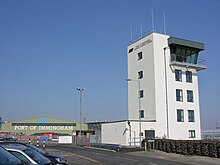Port of Immingham
| Port of Immingham | |
|---|---|

Immingham Marine Control Centre
|
|
| Location | |
| Location | Immingham |
| Coordinates | 53°37′38″N 0°11′27″W / 53.62718°N 0.19097°W |
|
Website www.abports.co.uk |
|
The Port of Immingham is a major east coast port, located on the south bank of the Humber estuary west of Grimsby, near the town of Immingham.
The port was established by the Humber Commercial Railway and Dock company in association with the Great Central Railway; the dock company incorporated and the works permitted by the Humber Commercial Railway and Dock Act of 1901. Construction of the dock started 1906 and was completed by 1912. The original main purpose of the dock was export of coal.
In the second half of the 20th century the port was considerably expanded beyond its locked dock, and east and west jetties; with the addition of several deep water jetties for bulk cargos: this included the Immingham Oil Terminal (1969, expanded 1994) for oil importation to the new Continental Oil Refinery and Lindsey Oil Refinerys; the Immingham Bulk Terminal (1970) built as a joint scheme by the NCB and BSC for coal export and iron ore import; the Immingham Gas Jetty (1985) for LPG import; and the Humber International Terminal (2000, expanded 2006) for bulk cargos. Roll-on/Roll-off terminals were first operated in 1966, and expanded within the dock in the 1990s, and outside the dock at the Immingham Outer Harbour (2006)
From the mid 19th century onwards the Manchester, Sheffield and Lincolnshire Railway developed the Port of Grimsby into a modern outlet for its rail system onto the east coast of England.
In 1874 a report was commissioned from Charles Liddell on alternatives to expansion at Grimsby – it recommended a new dock west of Grimsby at South Killingholme, preferable due to low land costs and proximity to the Humber estuary's navigable channel. Liddel's scheme was not proceeded with at that time.
...
Wikipedia
